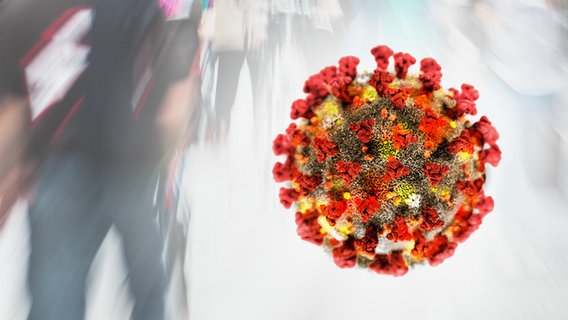Status: 02/24/2021 3:36 p.m.
By the end of this week, everyone over the age of 80 should have received an invitation. Health Minister Heiner Garg (FDP) made this clear in an interview with NDR Schleswig-Holstein in the morning.
Previously, his statement that this group would be “finished” by the end of this week caused irritation among many listeners. However, he did not mean the vaccinations themselves, but the written invitations to the appointments for people who are 80 years and older. Garg apologized.
AUDIO: Garg: “I apologize for the incomprehensible statement” (5 min)
–
–
–
This week the invitation will be in the mail
The last of these approximately 77,000 letters were sent two days ago. With the data sent, the recipients can then register: “My promise is that this week the people in Schleswig-Holstein who are 80 years old and older will be completely written to once.” Garg expects that it will take until April until all people with an appropriate invitation are vaccinated. Many listeners to NDR 1 Welle Nord expressed their displeasure in the morning, for example because they still had not received an invitation – even though they are over 80 years old.
Vaccinations for teachers and educators in March
According to Garg, primary school teachers, daycare educators and staff at the facilities will receive the vaccine from AstraZeneca in March parallel to those over 80 who are entitled to vaccinations, people with previous illnesses and specialists from the medical field. The health minister said in an interview with NDR Schleswig-Holstein that the so-called priority group two – “high priority” – could probably begin at the beginning of the month. Employees in daycare centers and schools would not be written to, but would have to register for appointments via the state’s internet portal after activation.
Vaccination sequence
The Federal Ministry of Health has one who can get vaccinated and when Vaccination prioritization recorded – as of February 18.
- Over 80 year olds
- People who are treated, cared for or cared for in inpatient facilities for the elderly or in need of care, or who work,
- Nursing staff in outpatient care services
- Employees in medical facilities with a high risk of exposure such as intensive care units, emergency rooms, emergency services, as service providers of specialized outpatient palliative care, corona vaccination centers and in areas with infection-related activities
- Employees in medical facilities who treat, care for or care for people at high risk (especially hemato-oncology and transplant medicine.)
–
- Over 70 year olds
- People with trisomy 21, with dementia, with intellectual disabilities, or with severe psychiatric illness, particularly bipolar disorder, schizophrenia, or severe depression
- People after an organ transplant
- Cancer patients, people with severe lung disease (e.g. interstitial lung disease, cystic fibrosis, COPD), very pronounced obesity, severe diabetes mellitus, chronic liver or kidney disease
- People who, according to an individual medical assessment, have a very high or high risk of a serious or fatal course of the disease after an infection with the coronavirus due to special circumstances
- Up to two close contacts of people in need of care who do not live in a facility, who are over 70 years old, who have had an organ transplant or who have one of the aforementioned diseases or disabilities.
- Up to two close contact persons for pregnant women
- People who work in inpatient facilities for mentally handicapped people or who regularly treat, care for or care for mentally handicapped people as part of outpatient care services
- People who work in areas of medical facilities with a high or increased risk of exposure to the coronavirus, in particular doctors and other staff with regular patient contact, staff from blood and plasma donation services and in corona test centers
- Police and law enforcement officers who are exposed to a high risk of infection while on duty, e.g. during demonstrations
- People who work in childcare facilities, in day care and in elementary, special or special schools
- People in the public health service and in relevant positions in the hospital infrastructure
- People who live or work in refugee and homeless facilities
- People who regularly work with older people or people in need of care within the framework of the offers for support in everyday life recognized under state law within the meaning of Section 45a of the Eleventh Book of the Social Code
–
- Over 60s
- People with the following diseases: obesity, chron. Kidney disease, chronic Liver disease, immunodeficiency or HIV infection, diabetes mellitus, various heart diseases, stroke, cancer, COPD or asthma, autoimmune diseases and rheumatism
- Employees in medical institutions with a low exposure risk (laboratories) and without care for patients with suspected infectious diseases
- Persons who are members of constitutional organs or in particularly relevant positions in the constitutional organs, in governments and administrations, in the armed forces, in the police, customs, fire services, in disaster control, in the judiciary and the administration of justice, in diplomatic missions or in development cooperation organizations
- People in relevant positions in critical infrastructure companies, in pharmacies and pharmaceuticals, public supply and disposal, the food industry, transport, information technology and telecommunications
- People who work in the food retail sector
- People who work in schools – except in elementary, special and special schools, e.g. in secondary schools – or in child and youth welfare institutions
- People with precarious working or living conditions
–
–
–
“This constant change is crap”
Garg is not yet able to estimate what effects the expected delivery bottlenecks will have at AstraZeneca. The manufacturer will probably only deliver half of the cans originally planned to the EU in the second quarter. That will be the topic at the next conference of health ministers, said Garg. “What else should I say about the delivery promises made by vaccine manufacturers? I heard that for the first time this morning. That leaves you spit away, your heart slips into your pants. You get an inner tantrum, but that changes everything Nothing.”
AstraZeneca is currently trying to find production sites outside the European Union in order to be able to compensate for part of it. “That’s a huge bummer when it comes to that, because we have to vaccinate quickly. These constantly changing announcements of delivery quantities are just plain crap.”
Further information



 –
–

